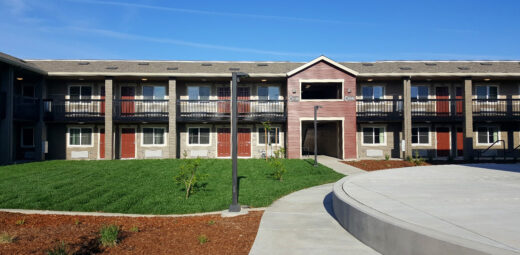
Aug 05The Courtyards on Orange Grove
Converting older, deteriorating motels into housing for the homeless can be a gamble with limited wins. However, with sound planning and strategic implementation, easing California’s long-term homelessness crisis using similar strategies is doable, especially now, in light of recently approved state funding to help tackle the issue.
 This April, Governor Gavin Newsom unveiled Project Roomkey, an initiative to secure hotel and motel rooms to protect the homeless population from the spread of coronavirus. The goal of Project Roomkey has been to provide non-congregate housing for people experiencing homelessness, as well as housing for frontline healthcare workers, with the aim of easing the strain on hospital capacity due to the pandemic. A $150M effort, Project RoomKey has housed 14,200 people since its launch with the support of the Federal Emergency and Management (FEMA) program. Nearly 300 hotels and motels in 52 California counties currently participate.
This April, Governor Gavin Newsom unveiled Project Roomkey, an initiative to secure hotel and motel rooms to protect the homeless population from the spread of coronavirus. The goal of Project Roomkey has been to provide non-congregate housing for people experiencing homelessness, as well as housing for frontline healthcare workers, with the aim of easing the strain on hospital capacity due to the pandemic. A $150M effort, Project RoomKey has housed 14,200 people since its launch with the support of the Federal Emergency and Management (FEMA) program. Nearly 300 hotels and motels in 52 California counties currently participate.
Using a similar strategy to create permanent affordable housing, Mercy Housing has a long history of setting precedents for how former hotels and motels, often seen as ‘short-term’ shelter, can evolve into long-term, subsidized housing for the vulnerable and unhoused. Examples in Mercy Housing’s portfolio include Casa Verde, a former 68-room hotel in San Leandro and Boulevard Court, a former motel in Sacramento converted into 75 homes of permanent housing for seniors and the formerly homeless.
 In addition to turning short-term approaches for housing people experiencing homelessness into scalable long-term solutions, Mercy Housing has refined the motel-conversion model with our recently completed community, The Courtyards on Orange Grove. The first motel in the City of Sacramento to be remodeled as permanent housing for the homeless in 15 years, this project transformed a blighted, crime-ridden Courtyard Inn motel into 92 quality apartments that are the new homes for 176 of Sacramento’s homeless population. A project fueled and financed by the creativity of Mercy Housing’s partners — Sacramento County Supervisor Susan Peters, District 3; the Sacramento Housing and Redevelopment Agency; and Wellspace Health — this transit-oriented development along the Watt Avenue Corridor in North Highlands is providing onsite mental health and recovery services through our partner Wellspace Health. The $32M affordable housing community will also provide full-time staffing and security, kitchen and laundry facilities, 1,800 square feet of community space with computers, exercise areas, a community garden, a dog run, and 130 parking spaces. The residents of The Courtyards on Orange Grove will have much more than access to basic shelter. They will have a real home in a supportive community with services that help keep them stably housed and will improve their well-being.
In addition to turning short-term approaches for housing people experiencing homelessness into scalable long-term solutions, Mercy Housing has refined the motel-conversion model with our recently completed community, The Courtyards on Orange Grove. The first motel in the City of Sacramento to be remodeled as permanent housing for the homeless in 15 years, this project transformed a blighted, crime-ridden Courtyard Inn motel into 92 quality apartments that are the new homes for 176 of Sacramento’s homeless population. A project fueled and financed by the creativity of Mercy Housing’s partners — Sacramento County Supervisor Susan Peters, District 3; the Sacramento Housing and Redevelopment Agency; and Wellspace Health — this transit-oriented development along the Watt Avenue Corridor in North Highlands is providing onsite mental health and recovery services through our partner Wellspace Health. The $32M affordable housing community will also provide full-time staffing and security, kitchen and laundry facilities, 1,800 square feet of community space with computers, exercise areas, a community garden, a dog run, and 130 parking spaces. The residents of The Courtyards on Orange Grove will have much more than access to basic shelter. They will have a real home in a supportive community with services that help keep them stably housed and will improve their well-being.
On June 30, 2020, Governor Newsom launched Project Homekey, a $1.3B initiative that will allow for the largest expansion of housing for people experiencing homelessness in recent history. Under the Homekey program, counties will partner with the state to acquire and rehabilitate a variety of housing types: hotels, motels, vacant apartment buildings, residential facilities, and other small homes. Additional federal stimulus funding can be accessed during the pandemic, and the Governor signed the new legislation on June 29 that provides exemptions from the California Environmental Quality Act and some zoning regulations for developments using newly available state and federal funding.
In the same manner that the Project HomeKey initiative builds upon the success of Project Roomkey, The Courtyards on Orange Grove builds upon the successes of Casa Verde and Boulevard Court. Mercy Housing California has demonstrated that, with new resources from the local, state, and federal government, we are exceptionally prepared to house and protect Californians during the next phase of this global pandemic.
No related posts.
Stay Up To Date
Get news on Mercy Housing and inspiring stories of change delivered to your inbox.


